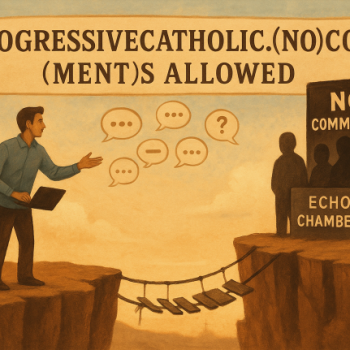Denying Catholics communion ‘is the last straw’
The quality of their outrage is different from anything I’ve heard before, even during the darkest days of the most recent clergy sex abuse scandal.
“They’re using communion as a weapon,” the angry, frustrated voices of the Roman Catholic faithful — and the not-so-faithful — have been telling me with increasing fervor in recent weeks.
“How can they do this?”
“Why would they do this?”
“This is the last straw,” they say.
Several American bishops have said they will deny communion to Roman Catholic politicians and others who disagree with church teaching on issues such as abortion, stem cell research, euthanasia and gay marriage. (It’s always interesting to me that the death penalty doesn’t come up on that list, as if that so-called seamless garment has a fraying hem.)
During meetings at their closed-door retreat in Denver this week, several hundred U.S. bishops have been discussing whether to deny communion to dissenting Catholic lawmakers.
The communion sacrament is a symbol of unity, and those who disagree with what the church teaches should not participate, some bishops argue.
In issuing his own decision instructing parishes in the Chicago archdiocese to deny the sacrament to several activists from a pro-gay group who approached the communion rail wearing rainbow sashes to show their disagreement with the church’s stand against same-sex marriage, Cardinal Francis George said the eucharist should not be made into some sort of political statement.
Other bishops have suggested that Catholics who support abortion rights or favor civilly sanctioned marriages for same-sex couples may be considered “manifest public sinners,” a state that would, according to church law, preclude them from receiving communion.
By and large, it seems that the majority of the Catholic laity in the United States, along with many of their priests and some of their bishops, aren’t buying those arguments. Communion shouldn’t be used as a means to control what Catholics believe, how they live, or how they vote, they say.
Refusing someone communion is cutting them off from the church. And from grace.
Denying a person communion, no matter what the circumstances, is simply un-Christlike. After all, they argue, when Jesus took the bread and the cup of wine and said to his disciples, “Do this in remembrance of me,” he didn’t add any qualifiers after “me.”
He didn’t say, “. . . as long as you are a member in good standing,” or “. . . as long as you are free from sin,” or ” . . . as long as you do what I say.”
There was no set of doctrines, dogma or social teaching to adhere to. No list of prerequisites. No secret handshake. Just a command to remember him.
At the end of the day, some would argue, none of us is worthy of the grace that the communion sacrament is supposed to represent. Not even the bishops.
So the other morning, after taking a swig of strong coffee, I stared across my plate of runny eggs and hashbrowns in a Hyde Park breakfast joint and asked the Rev. Donald Senior, president of Chicago’s Catholic Theological Union, the question so many have been asking me: How can the bishops justify denying communion to anyone?
“It’s a point of tremendous anguish,” Father Senior said. “Most priests, their preference would be not to refuse anybody.”
But there’s a theological tension between the notion that “we all come up on our knees” to receive the sacrament, and the idea that the communion elements are “a holy bread for a holy people,” he explained. It’s a tension that isn’t easily resolved and that has a long, difficult history.
And a particularly painful present, it would seem.
Father Senior doesn’t defend the position of the dozen or so bishops who have said publicly that communion should be denied to rebellious Catholics. “Politicizing [communion] is odious,” he said. Still, he believes there is an issue more complicated than politics that may be motivating them.
“It’s part of a reaction against the lack of understanding of the meaning of the eucharist,” he said, adding that most Catholics don’t know that according to church law they are only required to receive communion once a year during the Easter season. “There is a legitimate discussion to be had about understanding the sacrament.”
In other Christian traditions, some people fast and pray for weeks to prepare themselves to receive communion.
It’s a matter of being mindful of the sacredness of the sacrament.
“Thirty-five years ago, only about one-third of the church would go to communion,” Father Senior said.
The rest of the parishioners for whatever reason, perhaps because they hadn’t gone to confession before mass, would remain in the pews, he said.
It wasn’t until Pope Pius X in the early 1900s that Catholics were encouraged to receive communion more often because it was spiritually edifying, he explained.
But that openness in some ways has led to a lack of mindfulness, Father Senior said, particularly in the context of America’s epidemic casualness where everything is accessible and almost nothing gives us a sense of awe.
Unless, of course, it’s misplaced awe directed toward celebrity or material success.
For every Catholic who approaches the altar mindful of the transcendent ritual they are about to participate in, there are others who are simply going through the motions out of habit, punching their spiritual time card.
But from the outside, it’s impossible to tell who’s who.
What would be the objective indicators? How tightly their hands are folded in prayer? How deeply they genuflect? How they’re dressed — wool suit and spectators or shorts and sandals? Or how they vote?
There is another tension in the Roman Catholic church of which the current controversy over who is worthy to receive communion and who is not is simply a manifestation, Father Senior said.
It’s the question of who the church is: The Great Church or The Confessing Church. Think of it as the first stringers vs. the bench warmers.
The Great Church is all the people who call themselves Catholic. The Cardinal Georges and the Sen. John Kerrys. The Antonin Scalias and the Kevin Smiths. The Mother Teresas and the Madonna Ciccones. Those who go to daily mass and the “Cheasters” who are lucky to make it for Christmas and Easter. And everyone in between.
The Confessing Church is comprised solely of those who toe the line, obey church law, show up for mass, practice what they preach, are mindful of what the rituals mean. The confessing church is not everyone who claims to be a Catholic.
So far the Great Church has won out, Father Senior said, but there are plenty of people in the hierarchy, including more than a few American bishops, who believe the Confessing Church is the real church, and the only one they should be serving.
At the communion rail or anywhere else.
So what about the rest of them — the fair-weather Catholics, the benchwarmers, Cheasters and rebels?
The answer, Father Senior said, comes down to the same, unanswered question:
“Who are we to write them off?”
Copyright © The Sun-Times Company
All rights reserved. This material may not be published, broadcast, rewritten, or redistributed















